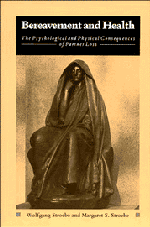Book contents
- Frontmatter
- Contents
- Preface
- 1 Introduction
- 2 The symptomatology of grief
- 3 Is grief universal? Cultural variations in the emotional reactions to loss
- 4 Depression models of grief
- 5 Stress models of grief
- 6 Mediators between stress and illness
- 7 The loss effect: health consequences of marital bereavement
- 8 Risk factors in bereavement outcome
- 9 Reducing the risk of poor bereavement outcome
- References
- Author index
- Subject index
2 - The symptomatology of grief
Published online by Cambridge University Press: 03 May 2010
- Frontmatter
- Contents
- Preface
- 1 Introduction
- 2 The symptomatology of grief
- 3 Is grief universal? Cultural variations in the emotional reactions to loss
- 4 Depression models of grief
- 5 Stress models of grief
- 6 Mediators between stress and illness
- 7 The loss effect: health consequences of marital bereavement
- 8 Risk factors in bereavement outcome
- 9 Reducing the risk of poor bereavement outcome
- References
- Author index
- Subject index
Summary
Grief, mourning, and bereavement: a conceptual clarification
The terms grief, mourning, and bereavement are often used interchangeably in everyday language. For example, someone who has suffered the death of a family member or close friend may either be said to be “mourning the loss,” “grieving,” or “grief-stricken,” or may perhaps be described as “bereft” at the loss. These statements may elicit slightly different ideas about the response of the person to death, but the overlap in meaning is considerable. It is reflected, too, in dictionary usage. Webster's dictionary defines to mourn as “to feel or show grief or sorrow; especially to grieve over someone's death,” and to grieve as “to cause grief or sorrow to; cause to suffer; distress.”
Following conceptual distinctions which have been made in bereavement (e.g., Gorer, 1965; Parkes, 1986) and emotion research (e.g., Averill, 1968, 1979), the terms will be differentiated here in the following way: Bereavement refers to the objective situation of an individual who has recently experienced the loss of someone significant through that person's death. Bereavement is the cause of both grief and mourning. Grief is the emotional (affective) response to loss, which includes a number of psychological and somatic reactions. It has been defined as an emotional syndrome (Averill, 1979; Lindemann, 1944), that is, a set of responses covarying in a systematic way. While some responses may be more symptomatic of grief than others, no single response is essential to the syndrome. Mourning refers to the acts expressive of grief.
- Type
- Chapter
- Information
- Bereavement and HealthThe Psychological and Physical Consequences of Partner Loss, pp. 7 - 25Publisher: Cambridge University PressPrint publication year: 1987
- 1
- Cited by



